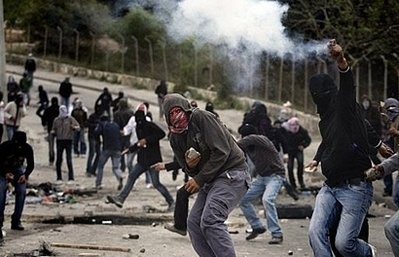Hundreds of Palestinians clashed with Israeli security forces across east Jerusalem on Tuesday in the worst rioting in years, as a senior Hamas leader called for a new "intifada" or uprising.
As the unrest rocked Jerusalem, US Middle East envoy George Mitchell delayed a visit to the region amid the worst diplomatic spat in decades between Israel and key ally the United States, which was struggling to revive peace talks.
Police fired rubber bullets, stun grenades and tear gas at Palestinian protesters who hurled stones and set up barricades of dumpsters and burning tyres in several neighbourhoods.
Twenty-one injured Palestinians were hospitalised and dozens more were treated on the spot, the Palestinian Red Crescent Society said.
One policeman suffered a pistol shot to the hand in an Arab neighbourhood of east Jerusalem, police spokesman Micky Rosenfeld said, adding that the unknown gunman got away.

Four other policeman were briefly taken to hospital and another 10 treated on site after being hit by rocks.
Sixty Palestinians were arrested.
Also Tuesday, stones were thrown at a bus in the largely Arab neighbourhood of Jaffa, south of Tel Aviv, said Rosenfeld, the first reports of unrest in other Israeli cities. The bus was damaged, but there were no injuries.
The clashes erupted across east Jerusalem, which Israel captured in the 1967 Six-Day War and later annexed in a move not recognised by the international community.
As the rioting flared, Hamas deputy politburo chief Mussa Abu Marzuk called for another popular Palestinian uprising.
"The intifada must enjoy the participation of all of Palestinian society," he told Al-Jazeera television. "Every Palestinian should rise up ... against the forces of the (Israeli) occupation."
In the Hamas-ruled Gaza Strip thousands of people took to the streets, chanting: "With our blood, with our souls, we sacrifice for you, Jerusalem."
The Palestinians have launched two intifadas against Israeli rule in the occupied territories, the first in 1987 and the second in 2000, but Hamas's calls for a new uprising in recent years have been largely ignored.
Facts on the ground: Israel's Jewish settlements
Israeli police chief Dudi Cohen told reporters he did not see signs of a new uprising: "We are seeing signs of disorderly conduct, but that's all."
Palestinians were already seething over Israeli plans to build 1,600 new homes for Jewish settlers in east Jerusalem.
Last week's announcement of the project also incensed Washington, and Mitchell postponed a visit to the region that was to start on Tuesday. That trip will not take place before the Middle East Quartet meets in Moscow on Thursday.
Palestinian negotiator Saeb Erakat said he would not travel to Moscow because of the tension in Jerusalem.
But even as Mitchell stayed away, the mutual anger appeared to ease slightly with warmer words being uttered on both sides.
US Secretary of State Hillary Clinton said Washington remained committed to reviving peace talks, telling reporters there was "too much at stake" for Palestinians and Israelis to abandon them.
"Our goal now is to make sure that we have the full commitment from both our Israeli and the Palestinian partners to this effort," she said.
Israeli-Palestinian tensions undermine US interests: general
Clinton and the White House reaffirmed the US commitment to Israel's security and to ties with Israel.
"It does not break the unbreakable bond that we have with the Israeli government and the Israeli people on their security," White House spokesman Robert Gibbs said.
Prime Minister Benjamin Netanyahu responded in a statement: "The State of Israel appreciates and cherishes the warm words from Secretary of State Clinton on the deep ties between the US and Israel and the US commitment to Israel's security."
UN chief Ban Ki-moon called for restraint from both Israel and the Palestinians, and reiterated that Jerusalem's final status should be decided by negotiations.
Earlier this month, the Palestinians reluctantly agreed to indirect talks with Israel after a 14-month break, but the outlook for a swift resumption of the peace process now looks bleak after the new settlements announcement.
The reopening of the twice-destroyed Hurva synagogue in the Jewish quarter of Jerusalem's walled Old City on Monday further fuelled tensions.
Many Palestinians view Israeli projects near the flashpoint Al-Aqsa mosque compound -- Islam's third holiest site -- as an assault on its tense status quo or a prelude to the building of a third Jewish temple there.
Jews call the compound Temple Mount and consider it their holiest site because the second Temple stood there before the Romans destroyed it in 70 AD.
























